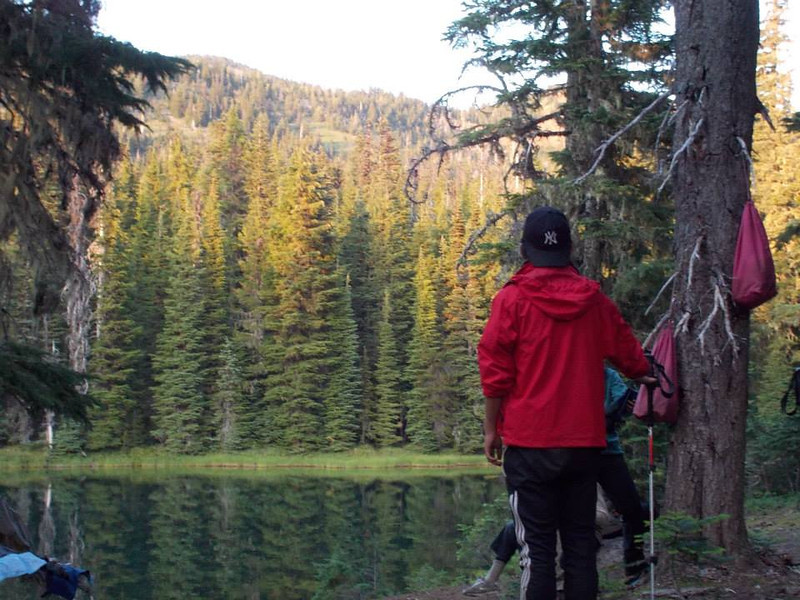Disconnecting from your child while they are on an expedition can be difficult, yet rewarding. Learn how and what it can teach both you and your child.

As Instructors, we want our students to leave a course feeling empowered by their expedition—the choices, challenges and the leadership fostered. We empower them to learn by participation, otherwise they’ll never feel equipped to solve problems themselves. Without you to be dependent on, they’re given a chance to question themselves and foster connections in a way that feels natural to them. Your child will feel proud of it, and you will too. It’ll strengthen their confidence in problem-solving and decision-making skills, along with their communication and social skills. They’ll come back from their course experience surer of themselves, with a newfound ability to be alone in discomfort.
So how and why can you benefit from time apart, too?
1. Strengthen Your Own Habits/Routines
You have a life (dreams, hobbies) too! With the busy schedule of your child, there’s a chance that you’ve gotten in the habit of sacrificing yourself for them. Of course, it’s rewarding to see them thrive and interested in their own hobbies, but remember that it’s important for you, too. Take this disconnect from your child as an opportunity to change or strengthen some of your own habits/routines. This will be refreshing and empowering for you, and upon their return, your conversation will be twofold. Hearing about all they did and learned, will be that much richer once you share your story with them. It will be more conversational and can foster a better relationship between you two. Both feeling good about the time you spent, you can help support each other with learnings and passions that may have surfaced, and depend on one another to integrate that into the familiar routine with a fresh perspective.

Photo by Kate Samp
2. Reconnect With Yourself
When was the last time you slowed down? Practicing being intentional with your day and how you fill your time can help you become more aware of your actions and interactions.

Slow down and celebrate that awareness. Ride a bike or walk to the grocery store instead of driving. Engage in a conversation during your lunch break with your co-worker rather than finding comfort in your phone or the endless chain of emails. Look up, be where you are, and not where you were before and where you’re going next. Just as your child doesn’t have an escape from being on a course—the luxury to drive away or scroll online—they learn to accept their surroundings and how to best adapt. You can practice that too. Disconnecting from your child can be an opportunity for you to reconnect with yourself.
3. Foster a Stronger Connection to Your Child by Writing Letters
You may feel a lack of control while your child is away and not communicating with you, but there are other ways to feel connected to them. A meaningful part of the “slow down” philosophy embedded in a course is taking time to reflect.
As this generation of children is growing up with the awareness that the convenience of a text is the fastest way to convey something, they’re missing out on how profound waiting is. Write them a letter (or an email to be printed) that can be sent to them during their expedition. Express all that you may say in text messages on a daily basis: “I love you!” or “I checked your grades…why did you get a D on the math final?!” and “When will you be home?!” A letter from a loved one back at home has the power to shift a student’s experience in a matter of minutes. The letter can be silly or thoughtful, often both. By writing it out, you’ll be surprised by what surfaces doing something intimate and slow. Disconnecting from your child physically does not put a stop to fostering connection. In fact, it provides an avenue to make it stronger. There is time and care put into a hand-crafted letter. You can rush to send a text, or an email, but the care that unfolds when you read a letter is worth waiting for. Those letters will be kept in a stashed away shoebox in your family’s home for years to come.

A Final Message
It takes time to build connections, and what that really starts with is disconnecting. We must be brave enough to give something up. Breaking down the benefits of disconnection can help you accept the challenge that sending your child Outward Bound can be hard, but meaningful. All of us need time away from all the distractions that have infiltrated our daily lives. And this experience can serve as a stepping stone in building recognition of how we communicate, with the demands of it being instantaneous, and how that affects interactions with our families and communities.
Challenge yourself to view disconnecting as an opportunity to gain a newfound admiration for discomfort and unfamiliarity. You and your child will feel more connected because of it.
Know how appreciative we are that you’re giving your child this opportunity. It’s a chance for both of you to experience something uncertain, but worthy. So, thank you.
About the Author
Blaine Weiss is an outdoor Instructor who works primarily with the FINS and Intercept programs of the North Carolina Outward Bound School. With a background in film and writing, she seizes the opportunity to fuse her interests in the creative arts with her love of the outdoors.




